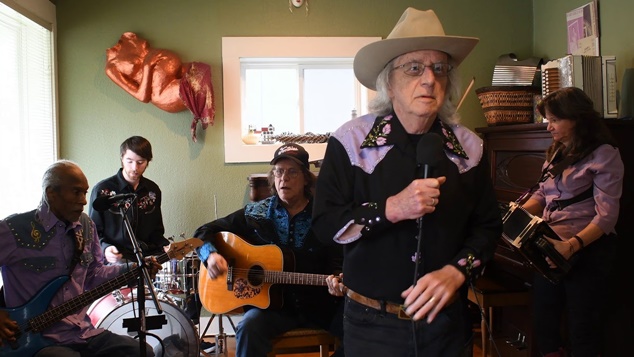
American gay country music band Lavender Country formed in 1972, just a few years after the tipping point of the Stonewall Riots, and their debut album came out the following year.
Formed in Seattle the band was lead by singer Patrick Haggerty, and included keyboardist Michael Carr, singer and fiddler Eve Morris and guitarist Robert Hammerstrom, who was the band’s only heterosexual member.
Their self titled debut album only had 1,000 copies printed, and the band played gay liberation events in their local community singing their gay themed country music tunes. The band broke up in 1976.
Interest in the long forgotten band picked up in 2000 when a magazine article looked into the history of gay music in the country genre, noting that Lavender Country’s album was the first gay themed album created. It lead to album getting reissued on CD, and the band reformed briefly, putting out an EP with a mix of old and new music.
In 2012 the band found a new legion of fans when their song Cryin’ These Cocksucking Tears was included on a compilation of music of gay liberation music. Strong Love: Songs of Gay Liberation 1972–1981 featured a whole host of musicians that had largely been forgotten.
Now the band have released a second album, 50 years after they first formed. Blackberry Rose and other songs of sorrow from Lavender Country came out on Friday and is available worldwide. It features 10 tracks including Gay Bar Blues, Stand On Your Man, Lament of a Wyoming Housewife and a remake of their earlier song I Can’t Shake The Stranger Out Of You.
I Can’t Shake The Stranger Out Of You became better-known after it was recorded by drag Trixie Mattel, who shortened the song’s title to Stanger. Mattel invited Haggerty along to join in the recording.
Patrick Haggerty spoke to NBC News about his life and journey in music, giving credit to his parents for being accepting of having a son who was different to the other boys.
“I don’t have an formal music training.” Haggerty said, “but when we were milking cows we had the radio on, and the radio was playing Hank Williams, and Patsy Cline and Ernest Tubb.”
Growing up on farm with his 10 siblings in the 1950’s Haggerty says he gives his parents a lot of credit for being accepting of him.
“Fortunately I had a father who was, number one, loving, and number two, insightful, and number three, very creative in how he handled me. I didn’t know who I was, but he knew who I was and he embraced me, as opposed tov rejecting to me as was happening with so many rural country queers in 1955.”
Haggerty shared that his father told him to be proud of who he was.
“He said, ‘Don’t sneak’, and he was talking about my sexual identity, ‘because if you sneak, it means you think you are doing the wrong thing, and if you spend your whole life thinking you’re doing the wrong thing, you’ll ruin your immortal soul, so don’t sneak okay.'” Haggerty recalled.
A new generation of gay artists are acknowledging Haggerty’s groundbreaking work, aside from Mattel covering his work, he’s also appeared on stage with Orville Peck. Meanwhile country music is embracing queer artists like never before, so Haggerty felt the time was right for a new record.
He shares that he’s never stopped writing songs, and now fans have twice as many songs from Lavender Country to enjoy.
Blackberry Rose and other songs of sorrow from Lavender Country is out now.
OIP Staff
You can support our work by subscribing to our Patreon
or contributing to our GoFundMe campaign.






